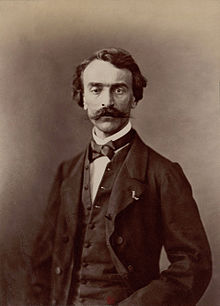Gérôme
| Jean-Léon Gérôme | |
|---|---|

Photo by Nadar
|
|
| Born |
10 May 1824 Vesoul, Haute-Saône, France |
| Died | 10 January 1904 (aged 79) Paris, France |
| Nationality | French |
| Education | Paul Delaroche, Charles Gleyre |
| Known for | Painting, Sculpture |
| Movement | Orientalism |
Jean-Léon Gérôme (11 May 1824 – 10 January 1904) was a French painter and sculptor in the style now known as academicism. The range of his oeuvre included historical painting, Greek mythology, Orientalism, portraits, and other subjects, bringing the academic painting tradition to an artistic climax. He is considered one of the most important painters from this academic period. He was also a teacher with a long list of students.
Jean-Léon Gérôme was born at Vesoul, Haute-Saône. He went to Paris in 1840 where he studied under Paul Delaroche, whom he accompanied to Italy (1843–44). He visited Florence, Rome, the Vatican and Pompeii, but he was more attracted to the world of nature. Taken by a fever, he was forced to return to Paris in 1844. On his return, he followed, like many other students of Delaroche, into the atelier of Charles Gleyre and studied there for a brief time. He then attended the École des Beaux-Arts. In 1846 he tried to enter the prestigious Prix de Rome, but failed in the final stage because his figure drawing was inadequate.
His painting, The Cock Fight (1846), is an academic exercise, depicting a nude young man and a lightly draped young woman with two fighting cocks, the Bay of Naples in the background. He sent this painting to the Salon of 1847, where it gained him a third-class medal. This work was seen as the epitome of the Neo-Grec movement that had formed out of Gleyre's studio (such as Henri-Pierre Picou (1824–1895) and Jean-Louis Hamon), and was championed by the influential French critic Théophile Gautier.
...
Wikipedia
